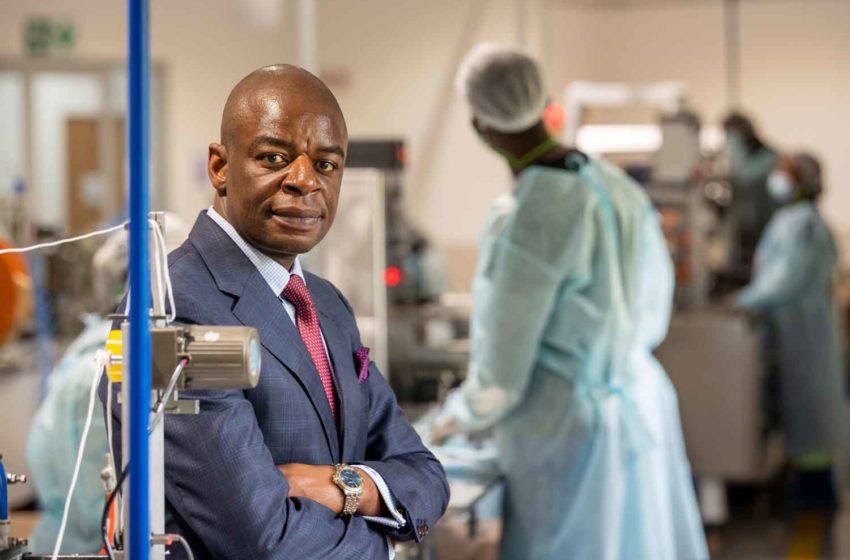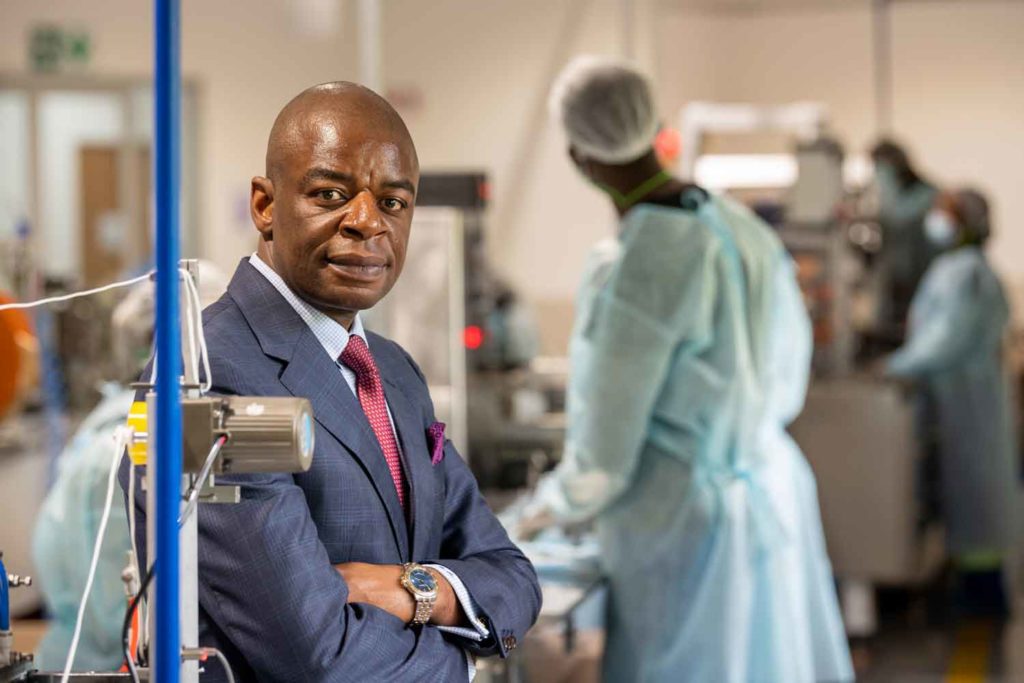African Ambition
- Also in TR Print Edition
- June 1, 2022
- 0
- 9 minutes read


The Pacific Cigarette Co. continues to gain momentum.
By Daisy Jeremani
The Pacific Cigarette Co. of Zimbabwe has made significant progress toward becoming one of Africa’s No. 2 cigarette makers as it now produces more than 3 billion sticks per year, according to company founder and chairman Adam Molai.
In a recent interview with Tobacco Reporter, Molai said Pacific was on track to becoming the largest indigenous African cigarette manufacturer by 2020 and the second-largest cigarette manufacturer on the continent, but its growth was disrupted by the Covid-19 outbreak.
“Significant gains have been made toward this objective, growing from inception to over 3 billion sticks per annum. However, the Covid-19 pandemic merely delayed—it did not destroy or disrupt—our ultimate goal. Our vision for global success through value addition and tobacco beneficiation remains undeterred, and we continue to strive to create value for the African economy and enhance the lives of Africans,” he said.
Born into an entrepreneurial family, Molai attended some of southern Africa’s most prestigious schools, including Peterhouse Boys, northeast of Harare. He worked at Ernst and Young in Zimbabwe and proceeded to the University of Buckingham in the U.K. where he graduated with a business degree in August 1992. Four years later, he left Lakehead University in Canada with a first-class commerce degree.
Molai returned home and ran some small businesses, but his biggest break came at 31 years old when he, together with Nick Havercroft, founded Savanna Tobacco, later renamed Pacific Cigarette Co. They launched it in 2002 as a threshing enterprise in Africa’s No. 1 tobacco growing country. This entailed buying tobacco stems from farmers, processing them and exporting them. They did not immediately have the resources to import a cigarette manufacturing plant, but investing in threshing and starting to export were the first serious steps that propelled Pacific to be the brand it is now.
Molai and Havercroft recognized the opportunity that lay in processing tobacco into cigarettes, and through innovative financing structures to raise foreign currency in a market plagued by foreign currency shortages, they were able to import the required equipment and became the first indigenously owned cigarette maker in Zimbabwe. In addition to the challenge presented by the foreign currency shortage, they also had to overcome the difficulties presented by the then poor relations between Zimbabwe and Germany, which is home to some of the world’s leading tobacco equipment manufacturers. At that time, Europe and the U.S. were sanctioning Harare over the land acquisition program and human rights issues. Despite this, Molai was still able to pay for the company’s first cigarette maker and packer to start producing Pacific Blue cigarettes for export in 2004
While this represented a big break at a personal level, breaking into a market that had been dominated by established brands for decades presented a considerable challenge, according to Molai. Competitors tried to derail and sabotage the newcomer in a variety of ways, at times using underhanded methods, he says.
Nonetheless, Molai persisted. “Although it was challenging competing with established global multinationals with infinite resources, we used this as a learning experience,” he said.
“Our competition provided us with the best education on business. They triggered the tenacity, resilience and boldness which has facilitated our growth and expansion into the region.”
A few years later, Molai turned the company’s focus to tobacco contract farming. He won government approval to establish contract farming in a country still dominated by auction sales. Critics labeled him an economic saboteur who wanted to use contracting to help white farmers, most of whom just had been evicted from their farms under the land acquisition program, externalize funds. But he was not deterred, having realized that the new, resettled farmers lacked the technical know-how, inputs and financing to seriously grow tobacco.
After two years of lobbying and hard work, the company was finally licensed to contract but with extremely stringent conditions that gave it no recourse against any defaulting farmers. This first contract scheme was called Zimbabwe Tobacco Growing Co., later rebranded to Northern Tobacco.
“I believe our foremost contribution to the tobacco industry is not cigarette manufacturing,” says Molai. “The most important contribution we made was fighting for permission to introduce contract farming of tobacco in Zimbabwe.”
Other companies launched their contract schemes later, and today, more than 100,000 farmers produce some 95 percent of the local crop under contracts.
Four years ago, Pacific partnered with China Tobacco Shaanxi Industrial Corp. (CTSIC), in an effort to serve the Chinese market. In January 2022, Pacific invested $9.5 million to relaunch two of its brands, Pegasus and Branson, to ensure that they would be able to not only cater to the premium segment but also offer world-class quality cigarettes at an affordable price. The Branson brand family was expanded with Branson flame, toasted and mint varieties while Pegasus now comes in a toasted flavor and a Chinese blend named Hong Ma.
Molai recognizes that the Chinese blends are still in their infancy but says the company is working to ensure that it is able to grow that market given that China has the world’s largest population, which is getting increasingly affluent and traveling or settling in other countries.
“As a disruptor and a trendsetter, Pacific will continue innovating to keep ahead of the competition,” he says. “The relaunch of some of our brands was not only driven by our Chinese partnership but also part of our DNA to ensure we satisfy our customers.”
Pacific’s deal with CTSIC, he said, was the first of its kind, where Chinese brands got licensed to an African entity. The partnership, which is in line with Zimbabwe’s “Look East” investment policy, remains a key part of the strategy to build Pacific’s market share, considering that China has the world’s highest number of smokers and there are an estimated 10,000 Chinese living in Zimbabwe.
It takes time to establish and grow a brand, says Molai, so Pacific is working tirelessly to gain the trust and loyalty of consumers.
“Our aspiration was to get African cigarettes into the Chinese market,” he says. “Africa is the only continent without a quota to supply cigarettes into China, and with Zimbabwe being the largest tobacco player on the continent, it was therefore my responsibility, on behalf of our continent, to make this happen.”
Pacific is also making inroads into neighboring South Africa, and they recently launched their Acacia brand and intend to continue expanding. As Covid-19 hit in March 2020, Pacific had to innovate and began a campaign centered on its mission that “People are the recipe for maximizing stakeholder value,” so they have been cementing and capitalizing on the relationships that they have on the market to ensure that they get the desired product placement and sales traction.
Speaking on the prospects for the African economy, Molai said the economy can only grow when businesses identify opportunities for beneficiation and increase their levels of domestic value addition, creating employment and industrializing while enhancing and developing its people. Value addition is especially imperative for Zimbabwe, which exports 98 percent of its tobacco raw and processes just two percent of local production into cigarettes.
“My personal objective was to democratize the tobacco industry from a highly racialized industry to one whose participation mirrors the continental demographics. This has been largely achieved with indigenous Zimbabweans now major players from growing to cigarette manufacturing.
“It is our responsibility, and as Pacific, we remain committed to the well-being and long-term sustainability of Zimbabwe’s golden crop by manufacturing and distributing products of international quality,” he said.
The businessman said his personal ambition has now expanded beyond tobacco and is now also focusing on the industrialization of Africa and beneficiation of other value chains so that the continent becomes an alternative supply chain to the world. Covid-19, he added, has exposed the risk concentration of current supply chains, thus Africa has a phenomenal opportunity to industrialize and create opportunities for it’s very young and unemployed youth.
In November 2020, his self-titled foundation launched JUA Kickstarter, a $1 million initiative to support startups on the continent. With support from partners, the fund was doubled in January 2021. Announcing the development, Molai recalled the grueling journey he traveled to launch a successful brand and felt the need for him to assist startups.
“With 65 percent of our population below 35 years of age, this population represents a significant threat or opportunity for our continent,” he told Tobacco Reporter.
